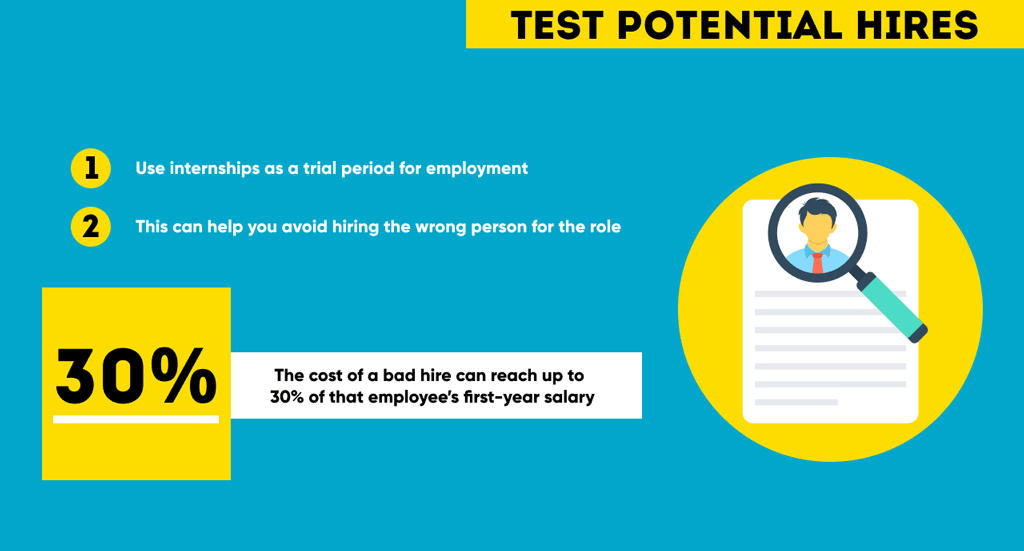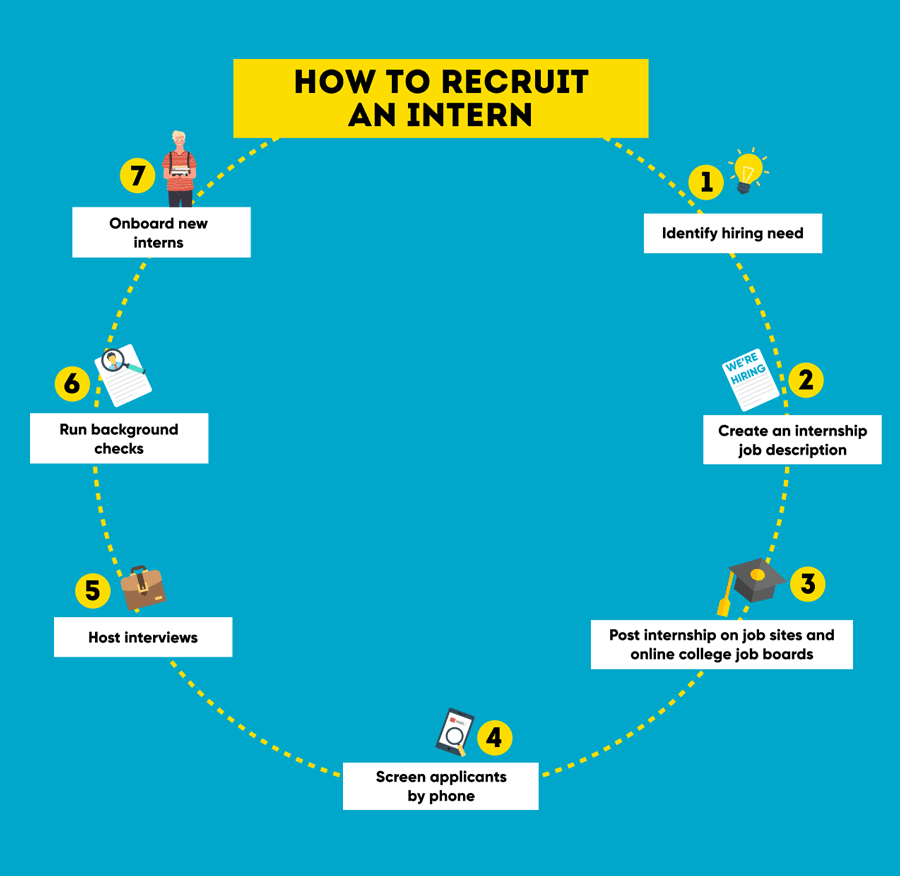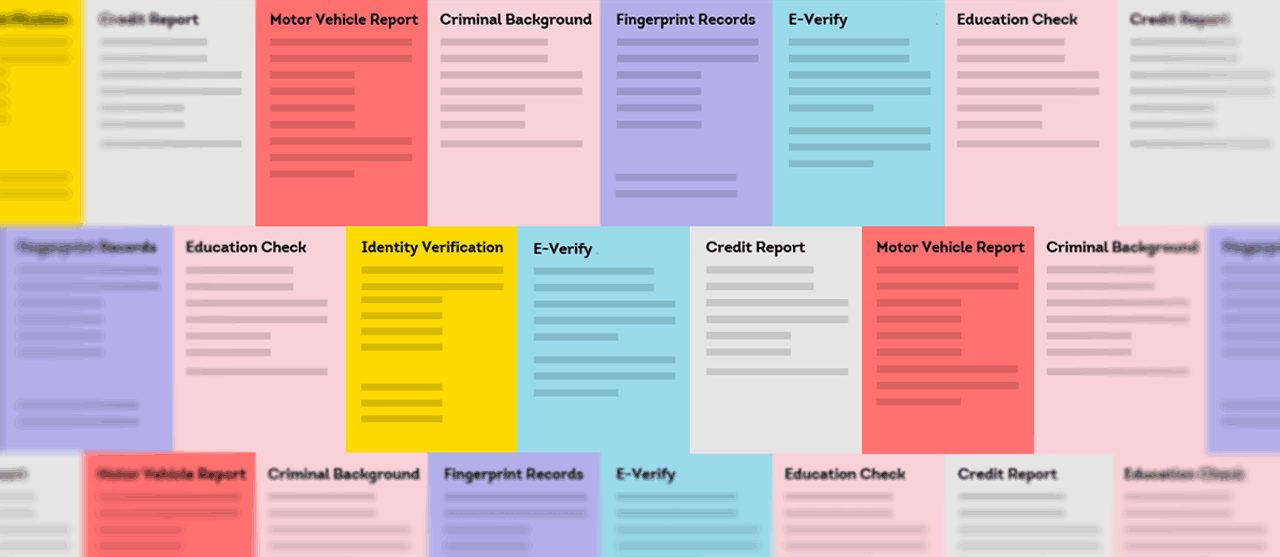Far from making copies and taking endless coffee orders, today’s interns are ready for hands-on educational opportunities that allow them to make meaningful contributions to businesses while also building skills for their resumes. This enthusiasm makes interns a particularly advantageous hiring option for small business owners and startups looking to recruit young professionals at the start of their careers. The benefits of creating an internship program include filling employment gaps, reducing recruiting costs, training current interns to become future employees, and building a good reputation while promoting your business.
Remember that this material is intended to provide you with helpful information and is not to be relied upon to make decisions, nor is this material intended to be or construed as legal advice. You are encouraged to consult your legal counsel for advice on your specific business operations and responsibilities under applicable law. Trademarks used in this material are the property of their respective owners and no affiliation or endorsement is implied.
Are you considering hiring interns for your small business?
Like rolling ocean waves, business trends are always in motion. Opinions on some business practices—such as open-concept offices—may fluctuate with the tides, but there is one trend that only seems to grow in popularity; internship programs have splashed onto the scene in the last few decades and have now become an integral part of the American workplace.
As schools are encouraging or even requiring students to complete internships, companies of all sizes are discovering the benefits of creating these educational programs and seeing first-hand how interns can help them sail towards brighter horizons.
According to Time, the number of college students participating in internship programs has quadrupled since 1992. From this staggering growth, employers have found a great resource; motivated students who are eager to learn and may be looking for full-time employment after graduation.

As great as these internship benefits can be, it’s also important to remember that improperly placed interns can leave you stranded in rough waters. Whether you’re hiring a full-time employee or a temporary intern, it’s crucial to vet anyone who will have access to your business. Run a comprehensive background screening through ShareAble® for Hires.
Additionally, if you do decide to bring interns on board, then you should always remember that an internship is first and foremost an educational endeavor that is meant to help a student learn more about a particular field or role through job shadowing and hands-on experience. Internships, especially unpaid internship programs, are subject to certain laws, including Department of Labor regulations and are more than a way to find cheap or free labor; your program should be well-defined and provide quality learning opportunities to your students (we recommend you check with your legal and compliance teams for a review of laws applicable to you).
In this article, ShareAble for Hires explores actionable solutions to bring on interns to boost your small business productivity. Learn more about internship potential benefits and tips to onboard your next intern below:
- Recruit future talent from a pool of interns
- Test out interns as potential hires
- Internships may increase retention rates
- Interns can boost team capacity
- Create awareness for future hires
- Tips to hire your next intern
1. Employers can recruit future talent from a pool of interns
An internship program can be a great strategy to build a candidate pool for future job openings. Students typically come into internships with little or no professional workplace experience. Although it may seem like a chore to train new workers in everything from database management to business etiquette, it’s actually a great opportunity to teach potential future hires to do things exactly the way you like them—without having to worry about bad habits they’ve picked up at other jobs.
During an internship, small business owners can mold students to become ideal, productive employees who can help the company grow. Additionally, working with an intern allows you to see their process and work ethic first-hand, which is a big asset if they apply for a full-time position in the future.
Depending on your program’s schedule, you could potentially create a year-round pipeline of future full-time hires, which then reduces the time and money spent on finding high-quality employees.
No matter what kind of internship you have, the program’s duration must be agreed upon by both you and your intern early on. You can’t hire on an intern for a 10-week period and then expect them to stay 12 weeks or more. In some cases, you may also have to work with the intern’s school to provide documentation such as progress reports or details about the program.
Depending on workflow and need, you may be able to take on new interns throughout the year and keep the flow of potential hires coming.
2. Employers can test interns as potential hires

Bringing on interns enables employers to “try before you buy”. Essentially, employers may benefit from internship programs by using them as a trial period for future full-time employment. Testing out prospective hires through on-the-ground training can be a streamlined way to find great employees and help you avoid hiring the wrong person for the role.
Considering that the cost of a bad hiring decision can (according to Northwestern University) reach up to 30% of that employee’s first-year salary, it is imperative to do your due diligence to find the right candidate. An internship program can help you mitigate the risk of a hiring the wrong candidate and reduce overall job search costs by allowing you to see your future job candidates in action.
Regular evaluation, coaching, and feedback should be an established part of your internship program. Along with helping to improve your intern’s performance, evaluations let you see progress up close and judge a student’s future potential.
To determine whether to take on an intern as a permanent hire, employers should:
- Examine output
- Analyze quality of work
- Identify strengths and weaknesses
- Observe how they work on a team
- Assess the intern’s career goals through open conversation
Once you’ve spotted star interns, you can help them develop into the ideal employee; work to cultivate their skills in all areas, particularly soft skills such as professionalism, communication, and attention-to-detail.
If you’re not in a position to immediately take on a permanent hire once the internship period comes to an end, then it may help to keep a detailed record of those who show potential promise. When a position opens up down the line, you can reach out to determine their availability and interest.
3. Internship programs may increase retention rates
Internships not only provide employers with a trial period, but also help students to decide if your company—or even your field—is a good fit for them; those who complete an internship with a company before being hired for a full-time position are far more likely to stay.
Not surprisingly, retention rates amongst intern hires (according to a Florida State University article) with internal experience is greater than those with external experience elsewhere.
- 1-year retention rate for intern hires with internal experience: 71.4%
- 1-year retention rate for intern hires with external experience: 59%
By improving retention rates, employers can save significantly on recruitment costs. Finding new talent can be budget-busting, especially for a small business working within tight margins. Between advertising costs, in-house recruiter salaries, third-party recruiter fees, sign-on bonuses, and employee referral bonuses, employers can shell out thousands of dollars to find just a single qualified candidate.
4. Interns provide more capacity to your current team

An internship program may also help your current team reach its full potential by allowing your existing employees to pursue their own professional development opportunities. Interns are an extra set of hands that can help workers with overly full schedules; they can take on projects and provide assistance in various areas of your business, which frees up time for your existing workers to focus on development. Be sure to coordinate with your Human Resources and Legal departments on intern work and associated legal requirements.
Allowing interns to “learn through doing” not only creates breathing room for current employees, but may also help improve overall retention rates. According to Shift Learning, up to 70% of employees say job-related development opportunities may convince them to stay at their job. When staff has the time and energy to devote themselves to tasks that further both their professional growth and add value to your business, everyone wins.
An internship program can also give current employees the opportunity to provide mentorship, which may help them build their own managerial skills. Permanent hires can connect with interns through training, feedback, and direction. Offering employees this mentorship opportunity provides your interns with good direction and helps the mentor gain leadership experience.
Additionally, fresh eyes can provide the added benefit of new ideas and perspectives. Interns may bring creative ideas with them, and can provide objective reactions to your business processes, strategies, and future plans. Include interns in meetings, encourage participation, and listen to their feedback—new ideas could be your next stepping stone to success.
What kinds of tasks can interns complete?
Interns aren’t relegated to just coffee runs anymore. Because internships are meant to be learning opportunities, interns are more commonly assigned higher-level tasks, including:
- Logistics
- Data analysis
- Problem-solving
A qualified intern can make real contributions to your current team’s productivity, as they are often eager to participate and are motivated to reach milestones they can use on their resume. If you create an internship program, then strive to provide interns with meaningful projects that will add value to your organization.
As you designate tasks, consider those that will provide your intern with the chance to learn new skills, help them understand your industry or field, and provide them with professional development.
Once you delegate work to an intern, be sure you have the framework in place for quality assurance. Your intern should know how to ask for help if they need it. You should also assign full-time employees to monitor their work and provide ongoing feedback. Be sure to coordinate with your Human Resources and Legal departments on intern tasks and associated legal requirements.
5. An internship program can create awareness of the field for future hires
To entice the best hires, you need a good way to get the word out about your business. Internship programs can be a great way to advertise the work your company does, your field, and the job opportunities available to new graduates.
By getting hands-on experience and telling their friends about it, interns can help you build a good reputation with fresh talent that is coming into the workplace.
Internships can also help you build relationships with nearby schools and colleges. If you have a regular internship program, then you may be able to attract talented interns through the school’s career office, thus building a steady current of talent for future hiring needs.
Tips on How to Recruit an Intern
When recruiting interns, it’s crucial to follow a streamlined hiring process checklist. Consider the tips below so you can design an effective internship program that can help provide real value to your organization.

1. Identify your hiring need
Before hiring an intern, take time to identify what help you need and what learning opportunities you can offer. Consider why you want an intern, the exact ways in which they could benefit your business, and what they would do every day. Consider how much time you can realistically devote to onboarding, training, and feedback. Also, think about your ideal intern and what qualities they possess. It’s important to lay out all the details of your internship program and provide clear expectations from the outset. Be sure to coordinate with your Human Resources and Legal departments your intern needs and associated legal requirements.
2. Create an internship job description
After selecting and describing intern responsibilities, write them all out in a thorough job description. Interns should understand their responsibilities and what they are supposed to be doing from day one; don’t hire an intern and expect them to bounce back and forth between teams with no clear direction. Learn how to write an effective job description, so you can attract qualified applicants.
3. Post internship on job sites and online college job boards
Get the word out to intern hopefuls by posting your job listing on a variety of job boards, career pages, and social networks. The list below provides example of the types of resources employers can use when posting an internship listing:
- Internship Listing Boards
- College Career Pages
The above lists are not exhaustive, but can serve as a starting point for you to find effective places to advertise your opportunity.
4. Screen applicants by phone
Before bringing a prospective intern for an interview, set up a quick phone call to ask some pre-screening questions. A phone interview can help you weed out unqualified applicants and uncover important information about a prospective hire in just a few minutes. Remember that you will be interviewing students who have little to no previous professional work experience and may not have had a phone interview before. It is expected that potential interns may not be as polished or professional as full-time hires. Make sure to adjust your phone pre-screening questions to include previous experience with school or extracurricular activities.
5. Host in-person interviews
Bring in your most promising candidates for an in-person interview with your team. Conduct panel interviews to assess your prospective intern’s capabilities, personality, and communication skills. Because internship programs are meant to provide learning opportunities for students ready to break into the professional world, your questions may vary from those of a typical interview for a full-time hire.
- What are you hoping to learn as an intern?
- In what ways can you contribute to our organization?
- Tell me about the challenges and end result of a project that you worked on in a previous role or course.
6. Run background checks
Don’t skip screening when it comes to interns. Although it may seem like going overboard to run a background check on a college kid who will only be with your organization for a few months, the devastating impact of any poor hire can last long after they’ve left. People that are unqualified, unwilling to learn, or directly malicious can cause serious financial damage to your business, derail productivity, and destroy office morale—even if they are there for only a short period of time.
Interns often have the same access to company resources and information as full-time employees, which means you should hold them to the same vetting standards. Regardless of the planned length of your internship program, make sure to be diligent by checking references, verifying documents such as transcripts and letters of recommendation, and running a thorough background screening through a comprehensive, reputable service. This is of particular importance for employers hoping to recruit permanent hires from their intern pool.
Employment background checks don’t have to be expensive or time consuming. You can screen interns online and verify a job applicant’s identity to make sure there are no red flags that could mean trouble for your business.
7. Onboard new interns
Effective onboarding leads to improved productivity and better learning outcomes, so take the time to carve out a dedicated program for new interns. Create a schedule that allow interns to meet with different members of the team for introductory briefings and specific training. Make sure your intern knows what they are supposed to be doing and who to ask for help, if needed. Provide necessary equipment, such as workspace, computers, and other tools relevant to the duties they’ll need to complete. Make sure all technical equipment is set up correctly before your intern begins, so they can hit the ground running. And be sure to coordinate with your Human Resources and Legal departments.
As you create your internship schedule, keep in mind that there are some duties that may not be appropriate for short-term workers in your office, especially if they are unpaid interns. The rules and regulations for interns by state may vary; as you create your program, you may want to consider seeking input from qualified legal counsel to make sure your internship is done by the books.
Bring in High Quality Interns and Quickly Screen Them with ShareAble for Hires
Hiring interns can provide a variety of great benefits, for both you and the student you host. If you want to save on recruiting costs, create a consistent current of prospective full-time hires, and improve retention rates, interns could be the answer.
With ShareAble for Hires, you can screen interns online and get comprehensive, reliable results you can trust in just minutes. An identity report helps verify your applicant’s identity and can confirm that they are who they say they are. Verifying that your intern’s personal information matches what they provided on their application and transcripts can give you more confidence in your hiring decision.
Additionally, just because an applicant may be younger than your typical job candidate doesn’t necessarily mean they don’t have a relevant criminal history that could land your business in hot water. A criminal background check generally run’s your intern’s information against several national and state-wide databases to see if there are any matching records that could put your livelihood at risk. Backed by TransUnion, a major and national credit reporting bureau, ShareAble for Hires provides reliable background, credit checks, and identity checks that can help you avoid risky hires—whether you’re bringing on interns or full-time employees.
While navigating the ocean of changing business trends can be difficult, employee screening doesn’t have to be. Vet potential interns and get your business in shipshape with ShareAble for Hires. Create an account for free and start screening today.

We hope this blog post has been informative and gives you some valuable tips on the benefits of hiring interns for your business. While efforts have been made to include pertinent information in this blog post, we cannot and do not guarantee that the information is current and complete. Also, this blog post is not and should not be construed as legal advice – please consult your own legal advisor. Please note, third party trademarks are the property of their respective owners, and no endorsement of or affiliation with TransUnion is implied.




